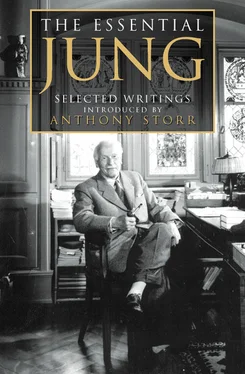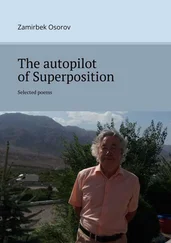The best examples of such regressions are found in hysterical cases where a disappointment in love or marriage has precipitated a neurosis. There we find those well-known digestive disorders, loss of appetite, dyspeptic symptoms of all sorts, etc. In these cases the regressive libido, turning back from the task of adaptation, gains power over the nutritive function and produces marked disturbances. Similar effects can be observed in cases where there is no disturbance of the nutritive function but, instead, a regressive revival of reminiscences from the distant past. We then find a reactivation of the parental imagos, of the Oedipus complex. Here the events of early infancy – never before important – suddenly become so. They have been regressively reactivated. Remove the obstacle from the path of life and this whole system of infantile fantasies at once breaks down and becomes as inactive and ineffective as before. But let us not forget that, to a certain extent, it is at work all the time, influencing us in unseen ways. This view, incidentally, comes very close to Janet’s hypothesis that the “parties supérieures” of a function are replaced by its “parties inférieures.” I would also remind you of Claparède’s conception of neurotic symptoms as emotional reflexes of a primitive nature.
For these reasons I no longer seek the cause of a neurosis in the past, but in the present. I ask, what is the necessary task which the patient will not accomplish? The long list of his infantile fantasies does not give me any sufficient aetiological explanation, because I know that these fantasies are only puffed up by the regressive libido, which has not found its natural outlet in a new form of adaptation to the demands of life.
You may ask why the neurotic has a special tendency not to accomplish his necessary tasks. Here let me point out that no living creature adjusts itself easily and smoothly to new conditions. The law of inertia is valid everywhere.
A sensitive and somewhat unbalanced person, as a neurotic always is, will meet with special difficulties and perhaps with more unusual tasks in life than a normal individual, who as a rule has only to follow the well-worn path of an ordinary existence. For the neurotic there is no established way of life, because his aims and tasks are apt to be of a highly individual character. He tries to go the more or less uncontrolled and half-conscious way of normal people, not realizing that his own critical and very different nature demands of him more effort than the normal person is required to exert. There are neurotics who have shown their heightened sensitiveness and their resistance to adaptation in the very first weeks of life, in the difficulty they have in taking the mother’s breast and in their exaggerated nervous reactions, etc. For this peculiarity in the neurotic predisposition it will always be impossible to find a psychological aetiology, because it is anterior to all psychology. This predisposition – you can call it “congenital sensitiveness” or what you like – is the cause of the first resistances to adaptation. As the way to adaptation is blocked, the biological energy we call libido does not find its appropriate outlet or activity, with the result that a suitable form of adaptation is replaced by an abnormal or primitive one.
In neurosis we speak of an infantile attitude or of the predominance of infantile fantasies and wishes. In so far as infantile impressions are of obvious importance in normal peoplethey will be equally influential in neurosis, but they have no aetiological significance; they are reactions merely, being chiefly secondary and regressive phenomena. It is perfectly true, as Freud says, that infantile fantasies determine the form and the subsequent development of neurosis, but this is not an aetiology. Even when we find perverted sexual fantasies whose existence can be demonstrated in childhood, we cannot consider them of aetiological significance. A neurosis is not really caused by infantile sexual fantasies, and the same must be said of the sexualism of neurotic fantasy in general. It is not a primary phenomenon based on a perverted sexual disposition, but merely secondary and a consequence of the failure to apply the stored-up libido in a suitable way. I realize that this is a very old view, but this does not prevent it from being true. The fact that the patient himself very often believes that his infantile fantasies are the real cause of his neurosis does not prove that he is right in his belief, or that a theory based on this belief is right either. It may look as if it were so, and I must admit that very many cases do have that appearance. At all events, it is perfectly easy to understand how Freud arrived at this view. Everyone who has any psychoanalytic experience will agree with me here.
To sum up: I cannot see the real aetiology of neurosis in the various manifestations of infantile sexual development and the fantasies to which they give rise. The fact that these fantasies are exaggerated in neurosis and occupy the foreground is a consequence of the stored-up energy or libido. The psychological trouble in neurosis, and the neurosis itself, can be formulated as an act of adaptation that has failed. This formulation might reconcile certain views of Janet’s with Freud’s view that a neurosis is, in a sense, an attempt at self-cure-a view which can be and has been applied to many other illnesses.
Here the question arises as to whether it is still advisable to bring to light all the patient’s fantasies by analysis, if we now consider them of no aetiological significance. Hitherto psychoanalysis has set about unravelling these fantasies because they were considered aetiologically important. My altered view of the theory of neurosis does not affect the psychoanalytic procedure. The technique remains the same. Though we no longer imagine we are unearthing the ultimate root of the illness, we have to pull up the sexual fantasies because the energy which the patient needs for his health, that is, for adaptation, is attached to them. By means of psychoanalysis the connection between his conscious mind and the libido in the unconscious is re-established. Thus the unconscious libido is brought under the control of the will. Only in this way can the split-off energy become available again for the accomplishment of the necessary tasks of life. Considered from this standpoint, psychoanalysis no longer appears as a mere reduction of the individual to his primitive sexual wishes, but, if rightly understood, as a highly moral task of immense educational value.
Another reason for Jung’s divergence from Freud was disagreement about the psychopathology of schizophrenia. Freud tried to maintain that withdrawal of sexual involvement with the external world was at the root of schizophrenic withdrawal, whereas Jung considered that schizophrenia involved a more general failure in adaptation to reality. This led to Jung’s use of the word “libido” as a synonym for psychic energy in general; whereas Freud used the term to signify only sexual energy. It must be remembered that Freud had little experience of schizophrenic patients, since most such cases were to be found in mental hospitals rather than in private practice. Freud’s only experience of mental hospital work was three weeks as a locum tenens (at Oberdöbling in June 1885), whereas Jung stayed at the Burghölzli from 1900 until 1909.
From “The Theory of Psychoanalysis” CW 4, pars. 271–8
THE PROBLEM OF LIBIDO IN DEMENTIA PRAECOX
In my book Wandlungen und Symbole der Libido I tried to furnish proof of these transgressions and at the same time to show the need for a new conception of libido which took account only of the energic view. Freud himself was forced to admit that his original conception of libido might possibly be too narrow when he tried to apply the energic view consistently to a famous case of dementia praecox – the so-called Schreber case. This case is concerned among other things with that well-known problem in the psychology of dementia praecox, the loss of adaptation to reality, a peculiar phenomenon consisting in the special tendency of these patients to construct an inner fantasy world of their own, surrendering for this purpose their adaptation to reality.
Читать дальше












